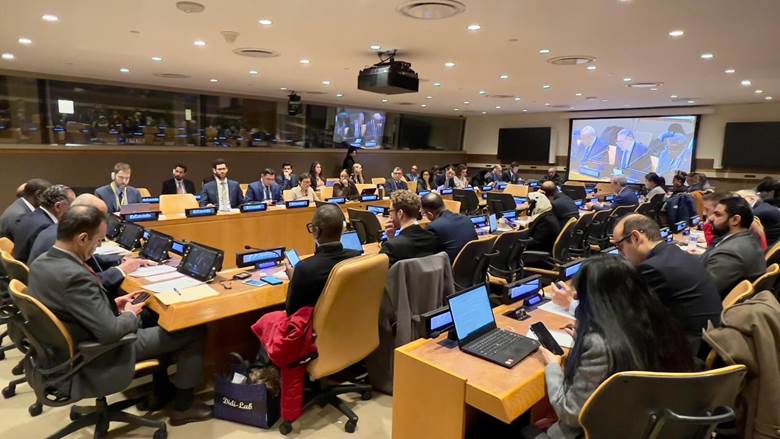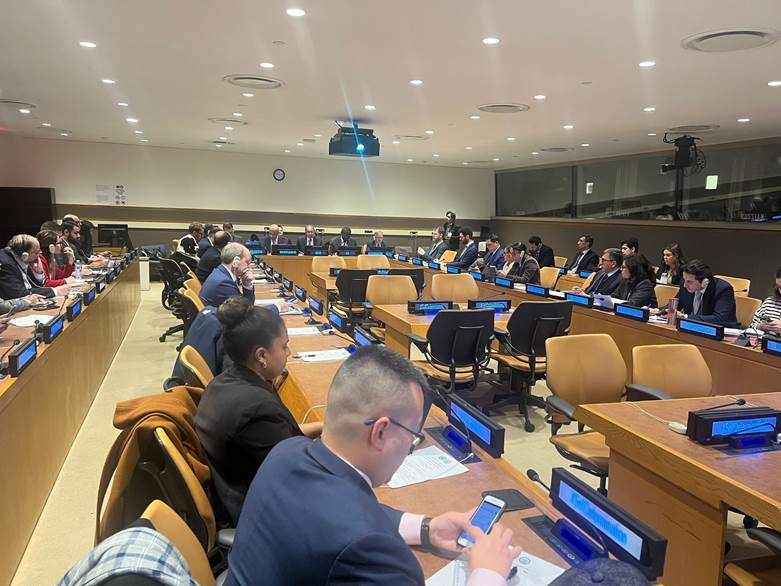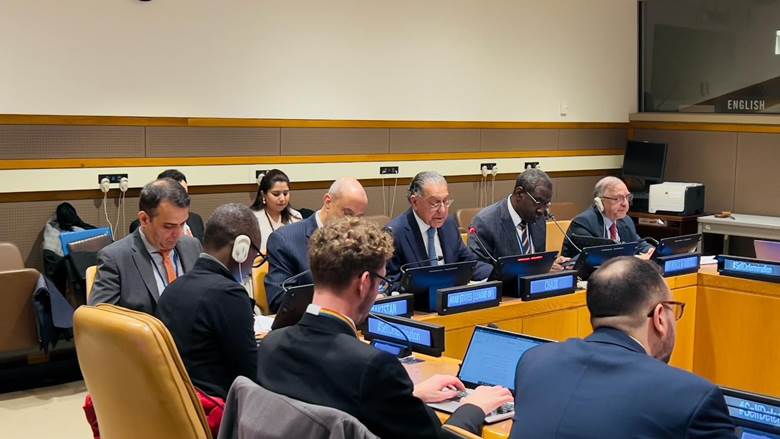


“Challenges to Realization of Right to Self-Determination in Contemporary Global Context” Spotlighted in NY
United Nations Headquarters, New York: An engaging interactive session took place at the United Nations headquarters on February 6 on the subject of “Challenges to the Realization of the Right to Self-Determination in the Contemporary Global Context”.
Eminent speakers who voiced their insightful views on the occasion included Ms Fionnuala d. NiAolain, former United Nations Special Rapporteur on Human Rights and Counter-terrorism, Commissioner at International Court of Justice, and Professor at University of Minnesota; Ambassador Munir Akram, Permanent Representative of Pakistan; Ambassador M. Maged Abdelaziz, Permanent Observer Mission of the League of Arab States; Ambassador Hameed Ajibaiye Opeloyeru, Permanent Observer for the Organization of Islamic Cooperation (OIC) and Dr Ghulam Nabi Fai, Chairman, World Forum for Peace & Justice. Others who participated in the general discussion included the Ambassador of Algeria, the Ambassador of Eretria, and Representatives from the embassies of India, Iran, Turkey, Venezuela, Morocco, and Syria.
Ambassador Munir Akram who presided over the meeting warned that the unresolved conflicts of Kashmir and Palestine pose a great threat to international peace and security. The right of self-determination was the "bedrock" of the modern international system, the fundamental principle of the UN Charter and the Universal Declaration of Human Rights. But, there were still examples where peoples continued to be denied the right of self-determination. "I would focus on the fact that we face two situations at least where the right of self-determination is being flagrantly denied: One is Palestine and the second is Jammu and Kashmir," Ambassador Akram emphasized.
Ambassador Akram added that the denial of self-determination to the people of Jammu and Kashmir deserves the full attention of the international community, pointing out that massive violations of human rights were taking place there and that the dispute over Jammu and Kashmir between India and Pakistan is an ever-present threat to international peace and security.
"With regard to both the situations in Palestine and Kashmir, and I suspect elsewhere, where peoples are oppressed and occupied, a lesson of history has been that colonial power has never succeeded in suppressing the right of self-determination of a people who are determined to sacrifice all for their freedom and liberation from foreign occupation," Ambassador Akram maintained.
The Kashmir tragedy, Ambassador Akram said, has intensified after the unilateral measures taken on August 5, 2019 that ended the statehood of Kashmir with India using brutal measures to clamp down on the unrest in besieged Kashmir.
Ambassador Hameed Opeloyeru, OIC Permanent Observer to the UN, said, “The OIC firmly supports the legitimate struggle of the Kashmiri people for the realization of their inalienable right to self-determination. OIC has always declared that the final settlement of the Jammu and Kashmir dispute, in accordance with the UN Security Council resolutions, is indispensable for durable peace and security in South Asia.”
Ambassador Opeloyeru added that “the OIC would continue to work for the implementation of several OIC resolutions culminating in the recent resolution No 8/49-POL on Jammu and Kashmir Dispute issued at the 49 th CFM held in Mauritania on 16-17 March 2023. The OIC would continue to support the principles and objectives of the UN Charter which would include recalling the numerous unimplemented UN Security Council resolutions on Jammu and Kashmir, which declare that the final disposition of the State of Jammu and Kashmir will be made in accordance with the will of the people, expressed through the democratic method of a free and impartial plebiscite, conducted under the auspices of the United Nations.”
Dr Ghulam Nabi Fai, Chairman, World Forum for Peace Justice, stated, “What principles and instruments do Kashmiris invoke for the redress of the wrongs inflicted on them? Not any conceived and inspired solely by their religion. They call for adherence to principles that are recognized by the Charter as basic to a peaceful and stable world order. The self-determination of peoples who have a defined and recognized individuality and fulfillment of international agreements constitute the sum and substance of their claim. The documents the Kashmiris rely upon were composed by Western hands in the Security Council of the United Nations. Yet they are being sidelined by those who believe in peace, justice, and human dignity.”
During her intervention, Ms Suman Sonkar, the Indian delegate said that Kashmir was an integral part of India and will remain so; and that there is peace and development in Kashmir. In response to her statement, Dr Fai raised two questions: one, India should ask Antonio Guterres why he insists that the Kashmir conflict should be resolved under the UN Charter and applicable UN Security Council resolutions, if it was an integral part of India; and second, given that there is peace and development in Kashmir, why India needs to keep 900,000 of its military and paramilitary stationed in Kashmir? - gnfai2003@yahoo.com

